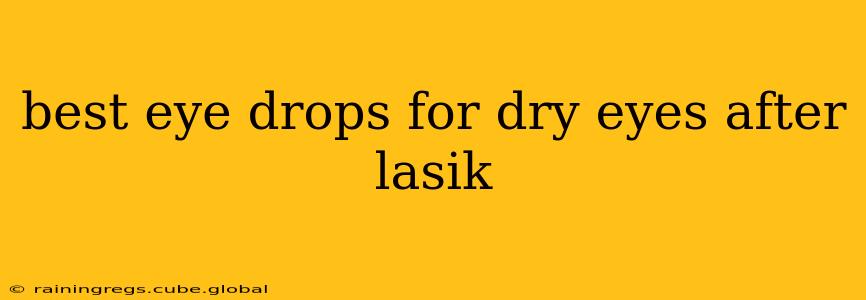LASIK surgery, while often life-changing, can lead to temporary—and sometimes persistent—dry eyes. The procedure disrupts the delicate balance of your tear film, impacting tear production and potentially causing discomfort. Finding the right eye drops is crucial for managing post-LASIK dryness and ensuring a smooth recovery. This guide explores the best options and provides answers to frequently asked questions.
What Causes Dry Eyes After LASIK?
Dry eyes after LASIK are a common side effect. The procedure involves creating a flap in the cornea and reshaping the underlying tissue. This process can disrupt the nerves that control tear production, leading to decreased tear secretion and a feeling of dryness, irritation, and discomfort. Furthermore, the surgery itself can sometimes cause microscopic damage to the tear film, exacerbating the problem. The severity and duration of dry eyes vary significantly between individuals.
What are the Best Eye Drops for Dry Eyes After LASIK?
There's no single "best" eye drop, as individual needs and responses can vary. However, several types are commonly recommended:
1. Artificial Tears: These are the most common and generally the first line of defense. They come in various formulations, including:
- Lubricating Drops: These provide temporary relief by supplementing your natural tears. Look for preservative-free options to minimize irritation, especially during the initial post-operative period. Brands like Systane Ultra, Refresh Optive, and TheraTears are popular choices.
- Gel Drops: These offer longer-lasting lubrication than standard lubricating drops, but may temporarily blur vision. They are often best used at bedtime.
2. Restasis: This prescription medication works differently than artificial tears. It increases tear production by stimulating the oil glands in your eyelids. While it doesn't offer immediate relief, it can improve the long-term management of dry eyes.
3. Xiidra (Lifitegrast): Another prescription medication, Xiidra works by reducing inflammation, improving tear production and reducing the symptoms of dry eyes.
What Types of Eye Drops Should I Avoid After LASIK?
- Eyedrops containing preservatives: Preservatives can irritate the eyes, particularly after surgery. Opt for preservative-free artificial tears whenever possible.
- Viscous drops during the day: While gel drops are excellent for nighttime use, they can blur vision during the day, hindering clear sight.
- Eyedrops containing steroids or antihistamines: Unless specifically prescribed by your ophthalmologist, avoid using these without consulting them first, as they can interfere with healing or have unwanted side effects.
How Often Should I Use Eye Drops After LASIK?
Your ophthalmologist will provide specific instructions on how often to use eye drops. Initially, you might need to use them very frequently, several times an hour. As your eyes heal, you can gradually reduce the frequency. Always follow your doctor's advice and don't hesitate to contact them if you have any concerns.
When Should I See My Doctor After LASIK About Dry Eyes?
If your dry eyes are severe, persistent, or accompanied by other symptoms like pain, redness, or blurry vision, contact your ophthalmologist immediately. They can assess the situation and recommend appropriate treatment. Don't hesitate to seek their advice; early intervention can often prevent complications.
Are There Any Home Remedies for Dry Eyes After LASIK?
While eye drops are the primary treatment, some home remedies can help manage dry eye symptoms:
- Warm compresses: Applying warm compresses to your eyes can help stimulate the meibomian glands and improve tear production.
- Omega-3 fatty acids: Including foods rich in omega-3 fatty acids in your diet can contribute to healthier tear production.
- Hydration: Drinking plenty of water helps maintain overall hydration, which can benefit your eyes.
- Humidifier: Using a humidifier, especially in dry climates, can improve the moisture content in the air and reduce evaporation from the eye surface.
Disclaimer: This information is for educational purposes only and does not constitute medical advice. Always consult your ophthalmologist or other qualified healthcare professional for diagnosis and treatment of medical conditions. The information provided here should not be considered a substitute for professional medical advice.
